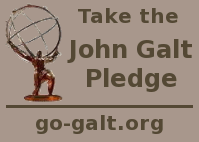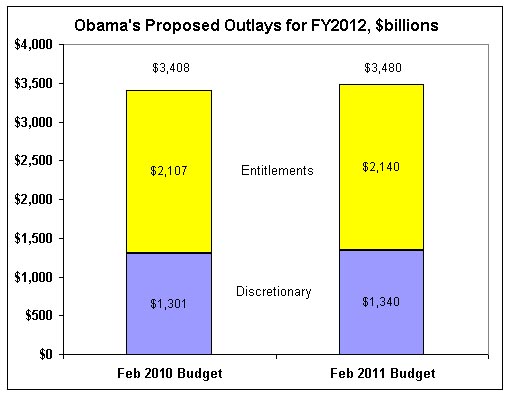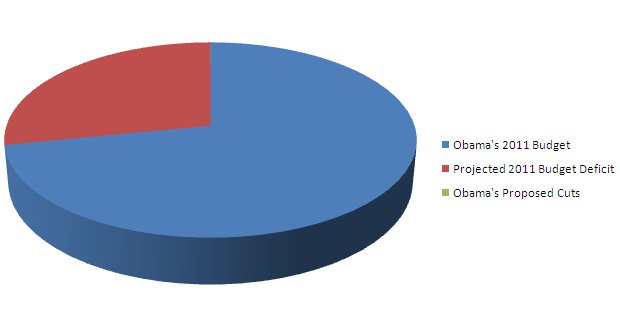Permanent link for article #0163:
|
Permalink 
The Right to Choose |
Subject: An Open Letter to Politicians and Political Candidates
Dear Representative of the People:
Based upon the current activity taking place in Washington D.C.
regarding matters of regulatory reform, spending cuts, balancing the
budget and reducing the deficit, it does not look like anything truly
meaningful is going to be accomplished in the foreseeable future.
Talk about reducing spending by trillions of dollars, whether proposed
by President
Obama or by Republicans such as
Paul
Ryan—assuming that these plans were ever to actually be put
into effect—sound great until you understand that these numbers
are not for next year's budget, but are unrealistically spread over a
period of 10 to 30 years, all the while allowing actual government
spending to continue to increase year upon year. All of this is just
another example of the Big Lie once again being foisted
off on the American public.
It is clear that the current Congress is not going to enact anything
close to what is required to put this country back on a sound footing,
so I am proposing that you take some truly bold action. Instead of
continuing to dicker with your fellow politicians over budget levels
and whether you are going to use a scalpel
or a machete
to either slowly whittle away at our future or simply decapitate us in
one fell swoop, I would ask that you work to remove the decision making
from Congress and the White House altogether and place it back in the
hands of every individual citizen.
My suggestion is that you strive to create legislation that gives each
person the option of deciding whether or not they wish to remain in,
and pay for the full set of federal entitlements, including Social
Security, Medicare, Medicaid and Obamacare, along with the the other
2,177 programs listed, as of July 8th, in the Catalog of Federal Domestic Assistance.
For those who support these programs and wish to continue to receive,
or remain in line to receive future benefits, they simply register
their choice and continue to participate. Other individuals who would
prefer to opt out of receiving all future government benefits would be
allowed to register that choice as well. In exchange for their
willingness to walk away from all past contributions to these programs,
and agreeing to never receive any future pay out or aid, they would
stop having entitlement payments deducted from their earnings and have
their taxes permanently reduced by an appropriate amount. They would
then be free to use these funds to manage their own insurance, medical
and retirement needs.
It is clear that a sizable segment of the U.S. population is currently
prepared to assume responsibility for their own lives, and would
willingly opt out of these programs. By doing so, this would
immediately and drastically reduce the future debt obligation of the
federal government and go a long way towards addressing the fiscal
crisis. For those who choose to remain in these programs, they would
continue to pay in as necessary to keep the programs alive. To account
for the shortfall that would occur in meeting current obligation with
a reduced tax base, other less important areas of federal spending
would be identified and eliminated, and the funding shifted over to
these programs as necessary in order to keep them solvent.
In addition to our fiscal problems, this country is also currently
facing great social instability. While there are, of course, many
sub-groups within the following simplified designations, our society
has become polarized into two broad factions: the fiscal conservatives
and the social progressives. Whereas people of diverse viewpoints
once coexisted peacefully together, as government has grown in size
and scope, imposing its control in ever expanding areas, many people
have justifiably come to feel that they are losing command over the
direction and purpose of their own lives, resulting in greater levels
of anxiety, dissatisfaction and unhappiness. In a country originally
built upon the proud virtues of industriousness and self-reliance, we
have now constructed massive institutions designed to foster
helplessness and dependence. Where we could once act freely and
independently in addressing our own problems and needs, the heavy hand
of government regulation has eliminated many if not most of those
options, requiring us to now come, hat-in-hand, begging for permission
to pursue our dreams, ideas and professions in ever more restricted
ways.
As government has assumed more and more control, individuals, groups
and businesses have sought to curry favor with politicians and
persuade them to wield government force in service of their particular
needs. This has led to waring factions vying for the limited resource
of favored political status, and it is this that ultimately creates the
polarization of our society that we observe today. As each group tries
desperately to have their particular values and goals imposed upon
all others, resentment grows into anger and finally transforms into
outright hatred for those who are seen as mortal enemies, bent upon
denying us the ability to live in the way that we each judge to be
best.
The only solution to this problem is to reduce government control over
the lives of all citizens and allow them greater freedom to make their
own decisions as to how best to live their lives. This is the second
important benefit to be realized by giving each person in this country
the ability to decide for themselves whether they wish to participate
in government run entitlement programs, or prefer to take personal
responsibility for their own future.
So I ask any politician or political candidate who is serious about
actually addressing the problems faced by the Unites States, and who
has the the confidence and courage to step beyond the ineffectual
norms of Washington, D.C. politics in order to explore truly creative
solutions, to give this proposal some serious thought and see if
something along these lines does not, in fact, offer a realistic path
to achieving meaningful immediate and long-term benefits.
External links to reprints of this article: |







